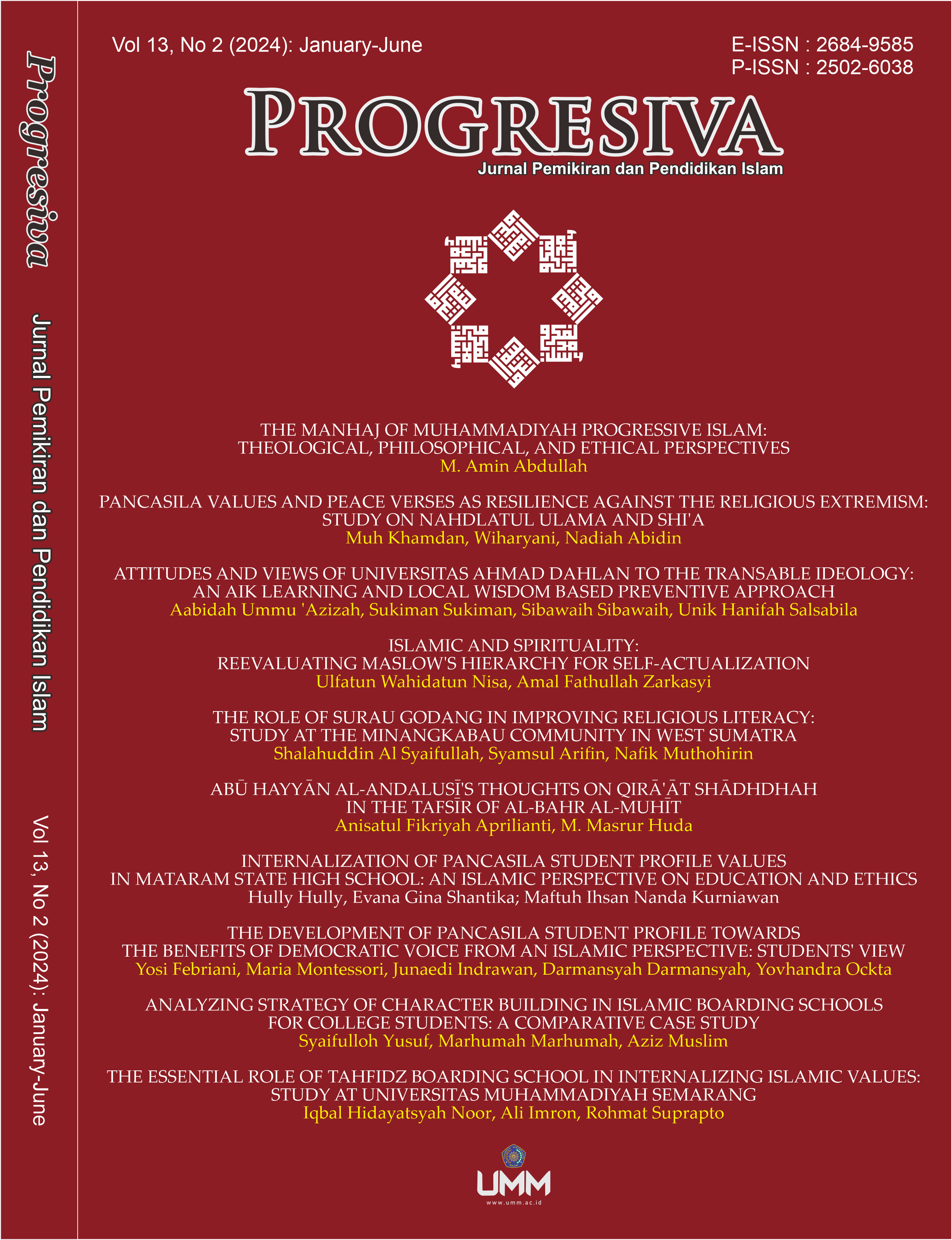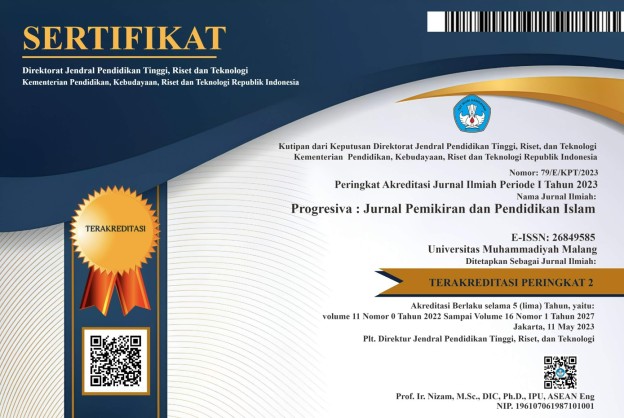The Manhaj of Muhammadiyah Progressive Islam: Theological, Philosophical, and Ethical Perspectives
DOI:
https://doi.org/10.22219/progresiva.v13i02.33887Keywords:
Manhaj, Advancing, Theology, Philosophy, EthicAbstract
This article examines the Progressive Islamic Manhaj initiated by Muhammadiyah as Indonesia's largest modern Islamic organization. The method or manhaj was formulated by Muhammadiyah as a serious effort to transform Islamic movements and thoughts that are modern and responsive to the development of the times. In its review, this study complements its discussion with theological, philosophical, and ethical perspectives in viewing and providing answers to various contemporary social, political, and religious problems that are increasingly complicated. Moreover, the urgency of the Muhammadiyah Progressive Islamic Manhaj is needed to respond to the invitation to religion in a strict, rigid, narrow, and closed manner carried out by certain groups in the name of religion, both orally, in writing, and creative approaches on social media. This research article uses a descriptive analysis method for various socio-theological problems faced by the Muslim community in Indonesia. Then, this article would like to explain a vital approach initiated by Muhammadiyah, namely the Progressive Islamic Manhaj, by updating the interpretation of the five main principles of maqāṣid sharī‘ah as a solution to contribute to the solution of various socio-religious problems. In the end, this study concludes that it is essential for Muhammadiyah to reform the basic epistemology of Islamic legal thought, especially those related to social life at large, especially with the spread of procedural reasoning religious perspectives or al-‘aql al-ijrā’ī in Fiqh and Kalām and legal-formal religious fatwa reasoning or al-‘aql al-iftā’ī, which seems to close the meetings of the universal values of humanity listed in the Qur'an.
Downloads
References
Abdullah, M. A. (2014). Religion, Science, and Culture: An Integrated, Interconnected Paradigm of Science. Al-Jami'ah: Journal of Islamic Studies, 52(1), Article 1. https://doi.org/10.14421/ajis.2014.521.175-203
Abdullah, M. A. (2019). Fresh ijtihad: Manhaj of Muhammadiyah's Islamic thought in the era of disruption. Suara Muhammadiyah.
Abu-Rabi., I. M. (2002). A post-September 11 critical assessment of modern Islamic history. In I. Markham & I. M. Abu-Rabi. (Eds.), September 11: Religious Perspectives on the Causes and Consequences. Oneworld Publications.
Aitkulova, M. (2021). Hizb ut-Tahrir: Dreaming of Caliphate. In M. A. Upal & C. M. Cusack (eds.), Handbook of Islamic Sects and Movements (pp. 402–420). Brill. https://www.jstor.org/stable/10.1163/j.ctv1v7zbv8.24
al-Mestiry, M. (2014). Jadal al-Ta'shil wa al-Mu'asarah fi al-Fikr al-Islamy. Mansyuraat Karim al-Syarif.
Arsalan, A.-A. S. (1976). Why Do Muslims Retreat and Why Do People Except They Advance? (M. Chalil, Trans.; Jakarta). Star Moon.
Auda, J. (2008). Maqasid Al-shariah as Philosophy of Islamic Law: A Systems Approach. International Institute of Islamic Thought (IIIT).
Bukhari, S. M. (2019). The Islamisation of ʿilm: Ideals and realities in a globalized world. In S. Akkach (Ed.), Ilm: Science, Religion, and Art in Islam (pp. 98–112). University of Adelaide Press. https://www.jstor.org/stable/j.ctvb4bt41.14
Burhani, A. N. (2013). Liberal and Conservative Discourses in the Muhammadiyah: The Struggle for the Face of Reformist Islam in Indonesia. In M. V. Bruinessen (Ed.), Contemporary Developments in Indonesian Islam: Explaining the Conservative Turn (New edition). Iseas-Yusof Ishak Institute.
Chaplin, C. (2021). Salafism and the State: Islamic Activism and National Identity in Contemporary Indonesia. NIAS PRESS.
Controversial Issues Resolved by the Sheikh of Al-Azhar in the Conference for the Renewal of Islamic Thought's Final Statement (2020, January 28). بوابة الأهرام. https://gate.ahram.org.eg/News/2364913.aspx
Directorate of Islamic Religious Higher Education, Directorate General of Islamic Education. (2019). Guidelines for the Implementation of Knowledge Integration in Islamic Religious Universities. Ministry of Religious Affairs of the Republic of Indonesia.
Ess, J. van. (1992). The Logical Structure of Islamic Theology. In I. J. Boullata (Ed.), An Anthology of Islamic Studies. McGill Indonesia IAIN Development Project McGill University,.
Fadl, K. A. E. (2001). Speaking in God's Name: Islamic Law, Authority and Women (48952nd edition). Oneworld Publications.
Guessoum, N. (2010). Islam's Quantum Question: Reconciling Muslim Tradition and Modern Science. I.B. Tauris.
Hanafi, H. (2000). Occidentalism (N. Bukhari, Trans.). Paramadina.
Huda, S. (2017). The Clash of Ideology Muhammadiyah: The Ideological Battle "Moderate versus Radical." Universe of Knowledge.
Ichwan, M. N. (2016). MUI, Islamist Movement, and Floating Ummah. Maarif, 11(2).
Institute for Policy Analysis of Conflict. (2015). Online Activism and Social Media Usage Among Indonesian Extremists (IPAC No. 24; pp. 1–26). Institute for Policy Analysis of Conflict. https://www.jstor.org/stable/resrep07806.1
Kamali, M. (2023). Social Change in Medieval Iran 132-628 AH (750-1231 AD) The Perspectives of Persian Historiography. Amsterdam University Press. https://doi.org/10.2307/jj.3102570
Kuru, A. T. (2019). Islam, Authoritarianism, and Underdevelopment: A Global and Historical Comparison. Cambridge University Press.
Meijer, R. (Ed.). (2009). Global Salafism: Islam's New Religious Movement (1st edition). Hurst & Company.
Meijer, R. (2009) ‘Global Salafism’, Politea : Jurnal Politik Islam, 5(2), pp. 1–6. Available at: https://doi.org/10.20414/politea.v5i2.4892.
Mir-Hosseini, Z. (2022). Global Contestations over Gender Equality in Islam: On Legal Interpretation and Muslim Feminist Scholars' Activism in a Human Rights Frame. In A. Scheele, J. Roth, & H. Winkel (eds.), Global Contestations of Gender Rights (1st ed., pp. 327–344). Transcript Verlag. https://www.jstor.org/stable/jj.11425489.21
Mudzhar, M. A. (1996). The Council of Indonesian 'Ulama' on Muslims' Attendance at Christmas Celebrations. In M. K. Masud, B. Messick, & D. Powers (Eds.), Islamic Legal Interpretation: Muftis and Their Fatwas. Harvard University Press.
Muhtadi, B. (2009). The Quest for Hizb ut-Tahrir in Indonesia. Asian Journal of Social Science, 37(4), 623–645.
Mulkhan, A. M. (2000). Pure Islam in the Peasant Society. Cultural Landscape Foundation.
Muthohirin, N. (2015) ‘Radikalisme Islam dan Pergerakannya di Media Sosial’, Afkaruna, 11(2), pp. 240–259. Available at: https://doi.org/10.18196/aiijis.2015.0050.240-259.
Muthohirin, N. (2019) ‘Politik Identitas Islam dan Urgensi Pendidikan Multikultural’, J-PAI: Jurnal Pendidikan Agama Islam, 6(1). Available at: https://doi.org/10.18860/jpai.v6i1.8776.
Muthohirin, N., Kamaludin, M. and Mukhlis, F. (2022) ‘Salafi Madrasas: Ideology, Transformation, and Implication for Multiculturalism in Indonesia’, FIKRAH, 10(1), p. 81. Available at: https://doi.org/10.21043/fikrah.v10i1.14380.
Nadwi, S. A. H. A. (2006). The Suffering of the World Due to the Setback of Muslims (A. Halim, Trans.). Fadlindo.
Noor Huda Ismail. (2014, August 7). Countering radical narratives on Indonesia's social media. The Jakarta Post. https://www.thejakartapost.com/news/2014/08/07/countering-radical-narratives-indonesia-s-social-media.html
Academic Pakja. (2006). Basic Scientific Framework & Curriculum Development of State Islamic University (UIN) Sunan Kalijaga Yogyakarta. UIN Sunan Kalijaga.
Paz, R. (2009). Debates within the Family: Jihadi-Salafi Debates on Strategy, Takfir, Extremism, Suicide Bombings and the Sense of the Apocalypse. In R. Meijer (Ed.), Global Salafism: Islam's New Religious Movement. Hurst & Company.
Rahman, F. (1982). Islam and Modernity: Transformation of an Intellectual Tradition. University of Chicago Press.
Rahmanto, D. N., Meliala, A. E., & Lolo, F. A. (2020). Ideology deconstruction of Islamic State of Iraq and Syria (ISIS) returnees in Indonesia. Indonesian Journal of Islam and Muslim Societies, 10(2), 381–408. https://doi.org/10.18326/ijims.v10i2.381-408
Saeed, A. (2005). Interpreting the Qur'an: Towards a Contemporary Approach. Routledge.
Sholikh Al Huda. (n.d.). MuSa (Muhammadiyah Rasa Salafi) -. Tabligh.id. Retrieved June 7, 2024, from https://tabligh.id/musa-muhammadiyah-rasa-salafi/
Soroush, A. (2002). Reason, Freedom, and Democracy in Islam: Essential Writings of Abdolkarim Soroush (M. Sadri & A. Sadri, Trans.). Oxford University Press.
Soroush, A. (2009). The Expansion of Prophetic Experience: Essays on Historicity, Contingency and Plurality in Religion (Nilou Mobasser, Trans.). BRILL.
Traore, A. (2019). The Dead Weight That Is Hindering the Islamisation of Knowledge. Islamic Studies, 58(2), 205–218.
Wagemakers, J. (2009). The Transformation of a Radical Concept: Al-wala' wa-l-bara' in the Ideology of Abu Muhammad al-Maqdisi. In R. Meijer (Ed.), Global Salafism: Islam's New Religious Movement. Hurst & Company.
Downloads
Published
How to Cite
Issue
Section
License
Copyright (c) 2024 Amin Abdullah

This work is licensed under a Creative Commons Attribution-ShareAlike 4.0 International License.


















